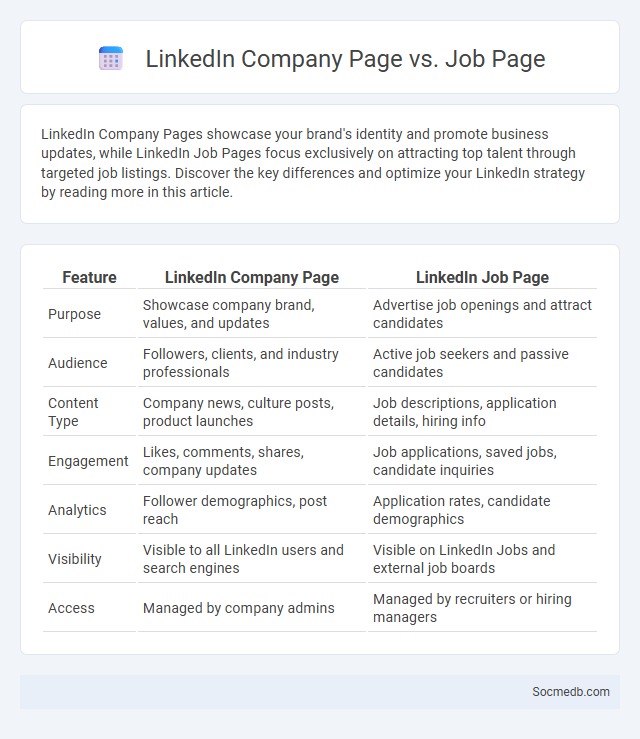
Photo illustration: LinkedIn Company Page vs Job Page
LinkedIn Company Pages showcase your brand's identity and promote business updates, while LinkedIn Job Pages focus exclusively on attracting top talent through targeted job listings. Discover the key differences and optimize your LinkedIn strategy by reading more in this article.
Table of Comparison
| Feature | LinkedIn Company Page | LinkedIn Job Page |
|---|---|---|
| Purpose | Showcase company brand, values, and updates | Advertise job openings and attract candidates |
| Audience | Followers, clients, and industry professionals | Active job seekers and passive candidates |
| Content Type | Company news, culture posts, product launches | Job descriptions, application details, hiring info |
| Engagement | Likes, comments, shares, company updates | Job applications, saved jobs, candidate inquiries |
| Analytics | Follower demographics, post reach | Application rates, candidate demographics |
| Visibility | Visible to all LinkedIn users and search engines | Visible on LinkedIn Jobs and external job boards |
| Access | Managed by company admins | Managed by recruiters or hiring managers |
Introduction to LinkedIn Business Page Types
LinkedIn offers various business page types tailored to different organizational needs, including Standard Pages for small and medium-sized businesses, Showcase Pages for highlighting specific brands or products, and LinkedIn Live Pages designed for real-time engagement with your audience. Understanding these types allows you to select the optimal page that enhances your professional visibility, drives lead generation, and fosters meaningful connections within your industry. Choosing the appropriate LinkedIn Business Page type empowers your company to effectively showcase its value proposition and grow its network.
What is a LinkedIn Company Page?
A LinkedIn Company Page is a dedicated profile for businesses on the LinkedIn platform, designed to showcase company information, share updates, and engage with professionals. It serves as a hub for brand storytelling, recruiting talent, and building professional relationships by posting content related to industry news, job openings, and company culture. Optimizing a LinkedIn Company Page enhances visibility in search results and attracts targeted followers, driving business growth and networking opportunities.
What is a LinkedIn Job Page?
A LinkedIn Job Page is a dedicated section on LinkedIn where companies post detailed job listings, including role descriptions, required skills, and company insights to attract potential candidates. Your LinkedIn Job Page allows you to showcase your employer brand, share employee testimonials, and highlight company culture to engage job seekers effectively. Optimizing this page increases visibility in LinkedIn search results and drives quality applications from professionals aligned with your hiring needs.
Key Features of LinkedIn Company Pages
LinkedIn Company Pages offer key features such as customizable company profiles, showcasing products and services, and publishing industry-relevant content to engage a professional audience. They provide analytics tools to track visitor demographics, engagement rates, and follower growth, enabling data-driven marketing strategies. Integration with LinkedIn Career Pages enhances employer branding by promoting job opportunities and attracting top talent.
Unique Functions of LinkedIn Job Pages
LinkedIn Job Pages offer unique functions such as detailed company insights, employee testimonials, and tailored job recommendations that enhance your job search experience. These pages provide real-time updates on hiring trends, workplace culture, and direct networking opportunities with recruiters. Leveraging these features can significantly improve your visibility and engagement with potential employers.
Audience Targeting: Company Page vs. Job Page
Effective audience targeting on social media distinguishes between your company page and job page by purpose and content focus. Your company page aims to engage potential customers and industry followers by showcasing products, services, and brand values, optimizing for broad professional demographics. In contrast, your job page targets specific talent pools with detailed role descriptions and company culture insights, maximizing relevance for job seekers within niche industries.
Branding Opportunities on Both Pages
Social media platforms offer extensive branding opportunities on both personal and business pages by enabling consistent brand messaging, visual identity, and audience engagement. Leveraging features like branded profiles, custom content, and targeted advertising on these pages enhances brand recognition and loyalty. Strategic use of analytics tools further optimizes content performance, ensuring both pages effectively contribute to overall brand growth.
Recruitment and Talent Acquisition Differences
Recruitment focuses on filling immediate job vacancies by sourcing and hiring candidates efficiently, while talent acquisition is a strategic, long-term approach to building a skilled workforce aligned with company goals. Social media platforms enhance recruitment by providing quick access to active job seekers, whereas talent acquisition leverages social media for employer branding and engaging passive candidates over time. Understanding these differences enables you to tailor social media strategies for effective hiring outcomes.
Analytics and Performance Insights
Social media analytics leverages data mining and machine learning algorithms to track user engagement, audience demographics, and campaign effectiveness across platforms like Facebook, Instagram, and Twitter. Performance insights utilize key performance indicators (KPIs) such as reach, impressions, click-through rates, and conversion rates to optimize content strategy and maximize ROI. Advanced tools like Google Analytics, Hootsuite, and Sprout Social enable real-time monitoring and predictive analytics for enhanced decision-making.
Choosing the Right Page for Your Business Goals
Selecting the appropriate social media page aligns your business goals with platform demographics and content style, ensuring targeted audience engagement. Each platform offers unique features that can amplify brand visibility, from Instagram's visual storytelling to LinkedIn's professional networking. By understanding your audience's preferences and behavior, you optimize your content strategy for maximum impact and return on investment.
 socmedb.com
socmedb.com